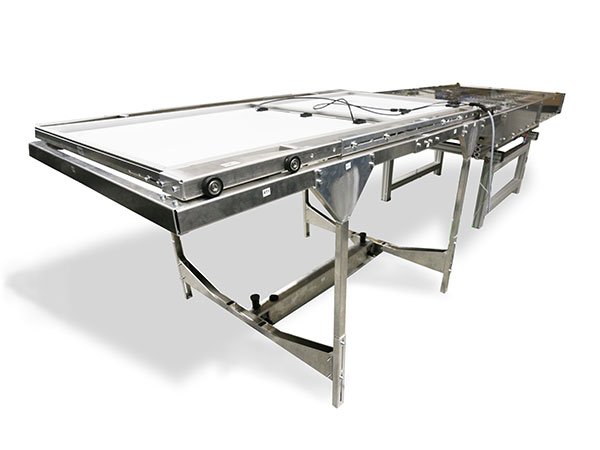With this system, TÜV Rheinland is able to carry out on-site testing of solar modules in accordance with the relevant IEC standards: for example, when the PV modules have arrived at port, shortly before installation on the construction site as an entry control or in existing solar parks for analysis of problem modules. The PV TravelLab is designed to test 150 to 200 PV modules per day. The test results are available immediately after the test. Quality problems can thus be recognized at an early stage. There is also no need for complex module transports and the sample size can easily be adapted when need arises.
“As a technology leader in the field of PV module tests, we have very high demands on our project partners. With MBJ we have found a reliable and competent company to implement our challenging specifications” says Dr. Werner Herrmann, Senior Expert PV Power Plants at TÜV Rheinland.
State of the art measurement technology
The PV TravelLab combines the latest measurement technologies for solar modules that are currently available on the market. The A+ A+ A+ LED light source, certified according to IEC 60904-9 Ed.3, ensures power measurements with very low measurement uncertainty, even with new PV module technologies. With a measuring range of 0-250V and 0-20A highly efficient crystalline PV modules as well as thin-film modules can be measured. High-capacity PV modules with PERC or heterojunction (HJT) solar cells are tested on the basis of the "Dynamic I-V" procedure patented by TÜV Rheinland. This procedure eliminates the otherwise typical measurement artifacts with these solar module types. A bypass diode test is also possible with the PV TravelLab.
For the EL measurement the PV module is moved in its roller mounted frame to the test position above the EL cameras. Two 5 megapixel cameras generate an overall module image in which cracks or broken cells can be found quickly. Problems in the connection of cells or an induced degradation like PID or LeTID can also be seen in the image. With the sensitive cameras, an EL analysis at only 10% of the nominal short-circuit current is also possible.
The system includes a computer controlling the hardware. It also runs the evaluation software. The measurement results are directly available for a detailed evaluation on site. The only requirement: an on-site test room that can be darkened, for example an empty freight or office container.
About TÜV Rheinland
TÜV Rheinland stands for safety and quality in virtually all areas of business and life. Founded almost 150 years ago, the company is one of the world’s leading testing service providers with 21,500 employees and annual revenues of 2.1 billion euros. TÜV Rheinland’s highly qualified experts test technical systems and products around the world, support innovations in technology and business, train people in numerous professions and certify management systems according to international standards. In doing so, the independent experts generate trust in products as well as processes across global value-adding chains and the flow of commodities. Since 2006, TÜV Rheinland has been a member of the United Nations Global Compact to promote sustainability and combat corruption.
Website: www.tuv.com


